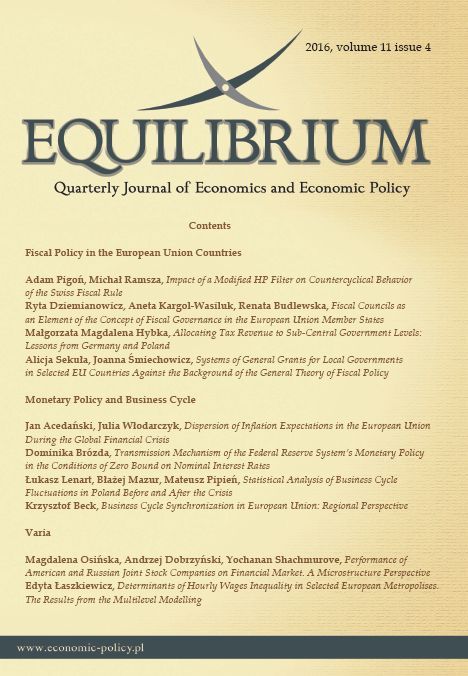Fiscal councils as an element of the concept of fiscal governance in the European Union member states
DOI:
https://doi.org/10.12775/EQUIL.2016.030Keywords:
fiscal policy, fiscal councils, fiscal governance, EUAbstract
Fiscal governance is defined as a combination of institutions, rules and norms that structure good governance in the area of fiscal policy. It can be named as the specific mechanism of coordination by using of tools such as: budgetary procedures (legislative fiscal rules), fiscal rules (numerical) and independent fiscal institutions/ fiscal councils. Fiscal governance focuses on how the fiscal policy is planned, approved, conducted and monitored, including the involvement of not only public bodies, but the business sector and civil society too. In this study, particular attention was paid to capturing the essence of the relationship between the qualitative elements of fiscal councils activity and its impact on stabilizing the public finances in the view of fiscal governance concept. During the last world crisis in the EU countries, an interest in establishing fiscal councils has increased. Before 2008 there were only seven institutions in the EU, while in 2014 there are already 19. The question is - are these institutions efficient in stabilizing public finances? Therefore, the main objective of the article is the assessment of the role of the fiscal councils in the coordination of the fiscal policy in the EU Member States. The conducted analysis verifies this role on the basis of theoretical deliberation of the current state of the art. The empirical research verifies fiscal councils? dependence on fiscal balance of EU countries. Research was conducted on the basis of the European Commission, Eurostat and International Monetary Fund data sets.
Downloads
References
Calmfors, L., & Wren-Lewis, S. (2011). What Should Fiscal Councils Do? Economic Policy, 68. DOI: http://dx.doi.org/10.1111/j.1468-0327.2011.00273.x.
Debrun, X., Hauner, D., & Kumar, M. S. (2009). Independent Fiscal Agencies. Journal of Economic Surveys, 23(1). DOI: http://dx.doi.org/10.1111/j.1467-6419.2008.00556.x.
Council Directive 2011/85/EU of 8 November 2011 On Requirements for Budgetary Frameworks of the Member States. Official Journal of the European Union L 306/41.
Godbillon, B., & Sidiropoulos, M. (2001). Designing Fiscal Institutions in a Monetary Union. Open Economies Review, 12(2). DOI: http://dx.doi.org/10.1023/A:
1008332429778.
Gołębiowski, G. (2010). Rada Polityki Fiskalnej. Infos, 9.
Hagemann, R. (2011). How Can Fiscal Councils Strengthen Fiscal Performance? OECD Journal: Economic Studies, 2011(1). DOI: http://dx.doi.org/10.1787/
eco_studies-2011-5kg2d3gx4d5c.
Hallerberg, M., Strauch, R. R., & von Hagen, J. (2009). Fiscal Governance in Europe. Cambridge: Cambridge University Press.
Komisja Europejska (2013). Independent Fiscal Institutions in the EU Member States in 2013. Retrieved form http://ec.europa.eu/economy_finance/ db_indicators/fiscal_governance/independent_institutions/index_en.htm.
Kosior, A., & Rubaszek, M. (2014). Ekonomiczne wyzwania integracji Polski ze strefą euro. Warszawa: Narodowy Bank Polski.
Międzynarodowy Fundusz Walutowy (2014). Fiscal Council Dataset. Retrieved from http://www.imf.org/external/np/fad/council/.
Moździerz A. (2012). Przesłanki powołania rady fiskalnej w Polsce. Zeszyty Naukowe PWE Kraków, 12.
Salto M. (2014). Report on Public Finances in EMU 2014. European Economy, 9/2014.
Sarrat de Tramezaigues, G. R. (2010). Assessing the 2005 Growth and Stability Pact Reform: A New Fiscal Policy Rule for the Euro Zone is Required. International Journal of Economics and Finance, 2(5). DOI: http://dx.doi.org/
10.5539/ijef.v2n5p140.
von Hagen, J., & Mundschenk, S. (2003). Fiscal and Monetary Policy Coordination in EMU. International Journal Of Finance & Economics, 8(4). DOI: http://dx.doi.org/10.1002/ijfe.215.






